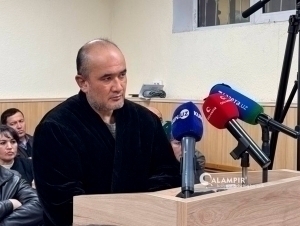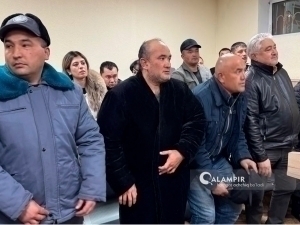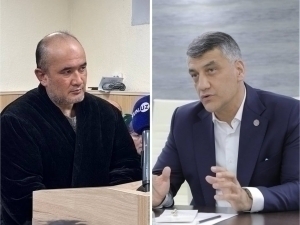Justice in 15-day prison
Review
−
02 January 2025 16748 6 minutes
Have you ever heard of an official sentenced to 15 days for insulting a subordinate? Or was someone penalized for illegally building a gas station in a residential area? Perhaps someone responsible for a prisoner's death faced such a sentence? No, you haven’t. But you will hear about a citizen who waited in line for days to buy gas with his own money—only to be jailed for expressing frustration at the system. This is Uzbekistan.
On December 31, social media was not filled with New Year’s greetings but with news of an Uzbek citizen sentenced to 15 days in prison for demanding his rights. A video circulated showing a man, exhausted from waiting in line, removing his shoes and voicing his grievances.
"I spent the night here. Where is the truth? What are you doing? Where is the president looking? Take out a machine gun and shoot a man. If you ask for gas, you won’t get it. The gas you receive damages your car engine. Isn’t there an organization that oversees this? Uzbekistan is not a poor, backward country. We have underground and aboveground resources," said Gayrat Dustov.
Dustov, frustrated after an all-night wait at a gas station that closed just as he was about to refuel, was sentenced to 15 days in prison.
He was accused of insulting gas station employees, disturbing public order, and committing petty hooliganism. Reports surfaced that Dustov was summoned to the Internal Affairs Directorate following his outburst. Hours later, another video emerged where he insisted he had committed no crime and refused to apologize.
"For the things I said, the complaints I made, if I used harsh words, I will not apologize to those in charge. If you do not fear God, give me the highest punishment. But I will not apologize to any of you," he declared.
Court documents suggest Dustov was pressured to apologize. On December 26, 2024, the Bektemir District Court of Tashkent City, presided over by Judge Dadakhonova, heard the case.
According to the court, on December 23, 2024, Dostov verbally abused employees of Morotrans LLC in the Bektemir district, disturbed public order, and committed petty hooliganism.
"In court, the offender admitted he shouted at gas station employees out of anger due to the closure. He expressed regret and assured the court it would not happen again, requesting leniency," the court decision reads.
Judge Dadakhonova found Dustov guilty under Article 183 of Uzbekistan’s Code of Administrative Responsibility, sentencing him to 15 days of administrative detention.
His detention was calculated from 14:20 on December 26, 2024. However, his family reportedly only learned of his arrest on December 31.
The arrest of a citizen demanding his rights has sparked widespread debate. Social media users argue Dustov’s detention symbolizes the suppression of justice and truth, further eroding trust in the judicial system.
Lawyer Abdumalik Abdullayev commented on the decision, titling his post, “The level of a judge in the example of a decision.”
"Firstly, in the part of the decision that describes the details of the incident, the time when the alleged offense was committed is not clearly indicated. When we say time, we mean the year, month, day, and hour.
Secondly, the incident report alleges that Gayrat Dostov insulted gas station employees with "various words." But what words exactly? Are they even considered insults by legal standards? We don't know. The details are missing.
Let me remind you – petty hooliganism isn’t defined by simply standing in a public place and raising your voice. If someone insults a specific individual, the court must identify that person and evaluate the nature of the insult. This isn’t just procedure – it’s the foundation of justice.
Thirdly, under Article 294 of the Code of Administrative Responsibility, Dostov's legal status at the time should have been "a person held administratively liable." Yet, even before the verdict, the court labels him an "offender." Why bother with a trial if the decision is already made?
Fourth, the decision claims Dostov’s confession was taken into account. And what was his reward for honesty? The maximum penalty under the article. Since when does a confession aggravate punishment? I was under the impression that acknowledging one's actions was supposed to mitigate the penalty, not seal the harshest outcome.
But here’s the kicker.
Fifth – and this is where it truly becomes absurd – the court cites "the level of social danger" when imposing the penalty.
Excuse me, Madam Judge. Are we now assigning social danger to administrative offenses? Let me remind you – the defining characteristic that separates crime from administrative violations is precisely this: social danger, " said the lawyer.
Every citizen detained for 15 days knows where they end up – the infamous panel prison. But not Gayrat Dustov.
According to Abdurakhmon Tashanov, chairman of the Ezgulik Society, Dustov wasn't taken to the standard detention center. He was transferred to the Tashkent city police department.
Tashanov detailed the situation:
“On December 27, Dustov was taken for interrogation to the Tashkent city police department. Today, I visited the prison panel with his lawyer. The officer on duty informed us that Dustov is being held at the city police department. Since the duty unit is on holiday, we couldn’t meet with him. No explanation was given as to why someone sentenced by the court is being interrogated and kept elsewhere.”
At present, three lawyers have signed on to defend Dustov. Due to the weekend, no one has met with him yet. But the movement is growing – over ten volunteer lawyers are now ready to step in.
We sought answers from Shokhrukh Giyasov, head of the press service at the Ministry of Internal Affairs. Is Dustov at the Tashkent city police department? Giyasov neither confirmed nor denied the claim. His response?
“Even if he was detained for 15 days, he could be involved in another matter. Should we simply wait out the 15 days?”
The Ombudsman – usually the first to step in during cases like this – remains silent. Meanwhile, social media voices grow louder in support of Dustov and his family. But not everyone agrees. Some claim Dustov is lying, bringing up personal accusations about his private life.
Let’s be clear – the issue isn’t his family. It isn’t whether he pays allowances to his children or tells the occasional lie. The issue is simple: he was imprisoned for speaking out.
So, as the voices continue to rise and the debate intensifies, one glaring question lingers:
Did the queues at the gas stations end with the imprisonment of the man who exposed the problem?
No. The gas shortage remains. The system remains broken. Only the man who dared to tell the truth is behind bars.



